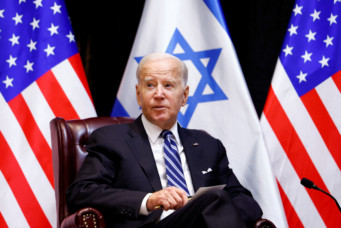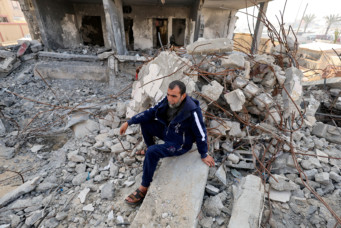The World Fears Wider War After Hamas Leader’s Assassination
The international community races to reduce tension after a series of targeted killings carried out by Israel

Update: A statement from Iran’s Islamic Revolutionary Guard Corps on Saturday said that Hamas leader Ismail Haniyeh has been killed by a “short-range projectile” fired from outside the state guesthouse where he was staying.
Global leaders have cautioned against the widening of Israel’s War on Gaza after the assassination of senior Hamas leader Ismail Haniyeh’ in Tehran this week. The death of the head of Hamas’ political wing came shortly after Israel assassinated a prominent Hezbollah leader in Beirut and two Al Jazeera media workers reporting near Haniyeh’s home in Gaza.
Early reports indicated that he was killed by a targeted missile strike, but The New York Times and other outlets reported that he was killed by a bomb planted in the Tehran state guest house months earlier. Haniyeh had been in Tehran to attend the inauguration of Iran’s recently elected president, Masoud Pezeshkian.
Condemnation of the assassination came swiftly from around the world as senior officials in the West worked to prevent the conflict from drawing in Iran, Iraq, Lebanon, and Yemen.
Parties Involved
Hamas and Iran blamed Haniyeh’s assassination on Israel, and both vowed retaliation. Khalil Al-Hayya, Hamas’ deputy head, said that the resistance will make sure that Haniyeh’s assassination will not go unpunished. Iranian Supreme Leader Ali Khameini also said that it was Iran’s “duty” to avenge Haniyeh’s death and promised “harsh punishment”.
Hamas’ military wing, the Izz Al-Din Al-Qassam Brigades, said in a statement that “the criminal assassination of the leader Haniyeh in the heart of the Iranian capital is a significant and dangerous event that shifts the battle to new dimensions and will have major repercussions across the entire region […] The enemy miscalculated by expanding the scope of aggression, assassinating resistance leaders in various arenas, and violating the sovereignty of regional states.”
Hezbollah leader Hassan Nasrallah, reacting to Israel’s assassination of senior Hezbollah commander Fouad Shukr in Beirut hours earlier, said that “[t]he Israelis do not know which red lines they have crossed, and on all support fronts, we have entered a new phase […] The enemy and those behind the enemy must wait for our response that will inevitably come.” He discussed the overall regional climate, saying that “[w]hen Iranians talk about the assassination of Haniyeh, they consider that the incident harmed their sovereignty, national security, prestige and honor.”
In a public statement, Israeli Prime Minister Benjamin Netanyahu took credit for Shukr’s assassination as well as that of another Hamas leader, Mohamed El-Deif, in a strike last month which killed at least 90 Palestinians in a designated safe zone. Hamas has yet to confirm Deif’s assassination.
Netanyahu also expressed his distaste for a ceasefire: “For months, there has been no week in which they have not told us—at home and abroad—to end the war […] All of the achievements that we have achieved in recent months, we achieved because we did not give in, because we made courageous decisions despite the great pressure at home and abroad. And I tell you: This was not easy. I needed to reject very great pressure.”
However, the Israeli prime minister did not comment on Haniyeh’s assassination; Israel has so far neither taken credit nor denied its involvement.
Meanwhile, a general strike in protest of Haniyeh’s assassination was held in Palestine, and Palestinian Authority President Mahmoud Abbas declared Wednesday a day of mourning.
International Responses
In the region, Qatar’s foreign ministry strongly condemned the assassination. Prime Minister Mohammed bin Abdulrahman bin Jassim Al Thani asked: “[H]ow can mediation succeed when one party assassinates the negotiator on the other side?” Haniyeh was buried in Doha after funeral prayers in the city that followed a public funeral in Tehran.
In Cairo, a statement from the Egyptian Foreign Ministry condemned Israel’s “dangerous policy of escalation” and said it showed a lack of Israeli political will for reducing tensions. The statement also said the assassinations set back Egypt’s and other country’s efforts at mediation. It called upon the UN Security Council and influential states to stop the escalation and put an end to this “cliff’s edge policy”.
Turkish President Recep Tayyip Erdoğan strongly condemned the assassination of his “brother” Haniyeh, describing it as a despicable act aimed at undermining the resistance. He also called for a Palestinian state along the 1967 borders with East Jerusalem as its capital.
At the time of writing, Saudi Arabia has not issued a statement.
Outside of the region, U.S. Secretary of State Antony Blinken said that they “were not aware of or involved in” the assassination, while President Joe Biden expressed concern regarding the regional situation and said that the assassination “doesn’t help” progress for a ceasefire. He also added that the United States will protect Israel from Iran.
The European Commission’s spokesperson for foreign affairs, Peter Stano, said that the European Union rejects extrajudicial killings and called for “maximum restraint” to avoid escalation.
Meanwhile, Russia strongly condemned both assassinations in Beirut and Tehran and “urge[d] all parties involved to exercise restraint and abandon any steps that could […] provoke a large-scale armed confrontation,” Andrei Nastasin, deputy spokesperson of Russia’s foreign ministry, said.
Brazil, for its part, strongly condemned Haniyeh’s assassination, calling it a “flagrant violation of Iran’s sovereignty and territorial integrity” which “further hinder[s] the possibilities of a political solution to the conflict in Gaza”. Brazil had already condemned the assassination in Beirut in an earlier statement.
China also condemned the assassination, while India has not yet issued a statement.
Australian Defense Minister Richard Marles, on the other hand, walked a tightrope and stated that Haniyeh “was central to the activities which occurred on October 7, activities which we have consistently condemned”. Marles warned of the dangers of regional escalation and emphasized the need for a ceasefire.
Growing Tensions
That there is global anxiety over the risk of escalation in the region is an understatement. Fearing that the longer Israel wages war on Gaza the higher the chance of a powder keg going off in the Middle East, many are calling for an immediate ceasefire.
From the Israeli government’s perspective, it seems as though these recent assassinations prove the success of their military campaign and justify their unwillingness to enter a ceasefire agreement. Yet, Netanyhu’s statements also reflect growing domestic tensions as members of the Israeli public panic that the killings will prevent any sort of hostage deal. While the assassinations may dismay the families of the hostages, the military successes could help pacify the hard-right who have been growing increasingly hostile to the government. The recent storming of an Israeli detention camp where nine Israeli soldiers had been detained after being accused of sexually abusing Palestinian prisoners has some Israeli commentators voicing fears of a civil war.
Blinken’s statement, that the United States was unaware of the assassination plans, relates to two continuing concerns facing the country. First, Israel’s unwillingness to heed U.S. calls for restraint, and second, the consequently increasing likelihood that the United States may have to put boots on the ground to defend Israel from the regional enemies it has provoked. Blinken’s call for an immediate ceasefire in Gaza and for all parties to deescalate indicates a strong desire to avoid military involvement.
The statements from Iran, Hezbollah, and Hamas all seem committed to avenging the recent assassinations of their cadres. At the time of writing, no reprisals have occurred. The last military exchange between Iran and Israel was, in context, relatively minor. Despite both countries exchanging missile strikes, neither country suffered significant damage and a regional outbreak of conflict did not occur. At the moment, it is not possible to predict whether the most recent bout of escalation will be similar to the last or if it will open the floodgates of regional violence.
Meanwhile, other international parties seem most interested in promoting the need for a ceasefire and discouraging conflict spillover. This sentiment is echoed by Qatar, Egypt, the United States, the European Union, Russia, Brazil, China, and Australia. The European Union described the Haniyeh assassination as an extrajudicial killing, which indicates Israel has violated international law, bringing to light serious concerns over the unlawful use of force in a sovereign state’s territory. This is especially relevant since the killing interferes with the proceedings of the International Criminal Court since the chief prosecutor recently requested a warrant for Haniyeh’s arrest.
Interestingly, Turkey did not call for a ceasefire in its statement and, just before the assassinations occurred, Erdogan implied that Turkey would be willing to invade Israel to protect the Palestinians. In response, Israel called for Turkey to be removed from NATO. This is not the first time Erdogan has made such declarations without acting on them, so this statement does not mean a Turkish invasion is imminent. It does, however, align with Turkey’s recent policy shift away from Europe (after being rejected from joining the EU) toward the Middle East.
As it stands, it is too early to predict whether the conflict will enter a wider, more destructive phase. While Iran, Hezbollah, and Hamas have promised revenge, each is also constrained by the realities of their political and military contexts. Hamas, while not defeated, has suffered major losses to its operational capacity. Iran and Hezbollah may have the military capacity to launch a larger attack, but it is unclear whether they are willing to risk triggering a full-blown regional war, a worry that may temper the degree of their response. Meanwhile, Israel is relying on support from the United States in responding to its regional enemies, but the United States’ willingness to become entangled in an active conflict is uncertain and may change depending on the upcoming presidential elections.
For now, the world waits.



